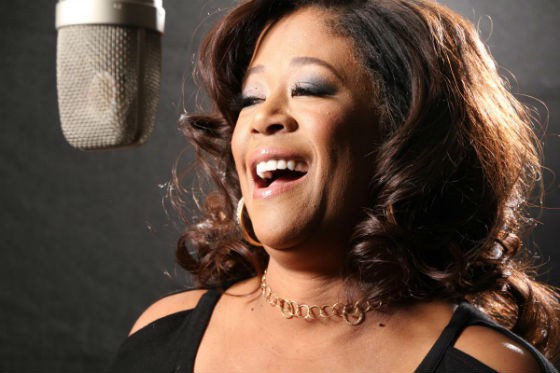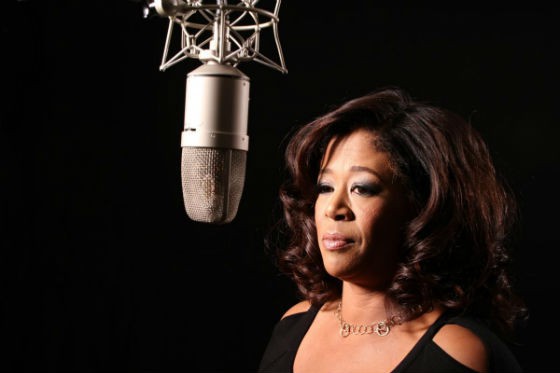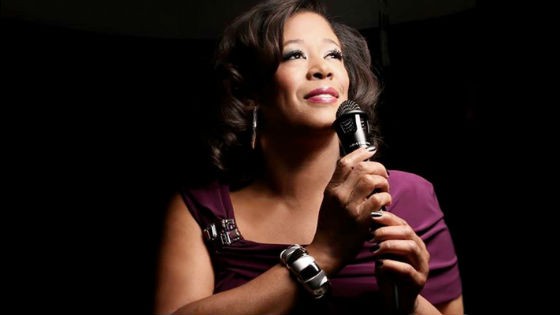It’s true that a famous surname draws a lot of attention.
Now imagine being the son or daughter of not one, but two famous parents. Double the benefits? Perhaps. But double the pressure? Most assuredly.
No one knows that better than Michele Coltrane. The only daughter of jazz giants John and Alice Coltrane. She was born into an iconoclastic musical dynasty whose impact is likely to linger as long as there are artists willing to push the boundaries. Yet, to her credit she’s ventured out and built an impressive career in her own right, working in radio, and as a performer, composer and impresario.
Her first album, I Think of You, was released to considerable acclaim in 1994, and now, nearly 20 years later, she’s about to offer up its follow-up, a collaboration with her guitarist and musical director Shea Welsh. We here at Crossfade recently caught up with the pair in anticipation of this weekend’s Miami Beach Jazz Festival at the Fillmore Miami Beach.

Crossfade: Often times, being the child of a famous parent can be a blessing or a curse as people tend to make some unfair comparisons. And in your case you have two extremely famous parents. So has it helped or hindered? Are the expectations sometimes overwhelming?
Michelle Coltrane: When I was a young girl thinking back…. all the Coltrane siblings –me, John Jr. Ravi, and Oran lived as an ordinary family does. We always traveled a lot, to music halls, clubs and events. So we began hearing the reactions of people at these places, people who would be so fascinated to meet our parents and even meet us.
As we grew older, and with the loss of our father, it became clear that our parents were unique and highly regarded for their level of talent and their musical contributions. All the children were encouraged to study an instrument of their choice and take lessons, and to participate in band, orchestra, choir, and whatever else. I chose the clarinet, then violin, and later on, I took vocal lessons and piano lessons as well. This part of our life is the blessing and the privilege we were given, to experience and learn the fundamentals of music. On the professional level, yes, it helps to have the name recognition because I believe the public is truly hoping to see an extension of the parents legacy. They want to see the continuance of an artist they loved be extended through the offspring. Once I understood this, I accepted it graciously and humbly without feeling I would disappoint anyone. I look at my parents as many people do — as innovators. They mastered the artistic process by living it without fear of criticism. They composed and performed the truth as they heard it. My goal is to uphold the same values and artistic integrity that my parents did. I write songs, and perform them, and continue to search for the highest level of truth that can be found for an artist.
Was it a given that you would be a musician?
It is always in the mind of a child of an actor, doctor, or musician etc. to ponder whether they have the ability to do what their parents do. With music, there are many levels that one can acquire and enjoy, be it church or family gatherings. Even an outstanding musician can share their love of music without ever playing Carnegie Hall. The professional side that comes along with the business of the music industry is the game-changer. In my case, the decision to return to music professionally was due to a few things. For one, my children have grown up, and I have the time necessary to devote my all to the process. And I love to create. It’s my soul food. Yes, I have pursued other interests. However the music always gave me the most pleasure.
How did your career path first take flight?
I was born in Paris France but returned to the states at a very young age. I started out singing background and doing demo work in the states in the ’80s. That led me to some gigs in Japan, where I lived for two years performing in clubs that catered to the contemporary music audience. I moved back to Los Angeles in the early ’90s and began collaborating with Scott Hiltzik, a composer and pianist. We produced an album entitled I Think of You. I also did some performances in Paris night clubs, and here in the U.S.
What was the critical reaction?
I received many complimentary critiques!
Did your parents ever try to steer you away from music?
Never ever. To them, it was a part of life. They always encouraged me and my brothers.
What do you think was John Coltrane’s greatest legacy?
John Coltrane, the man, is the epitome of artistic innovation. There have been countless saxophone players, scientists, engineers, and athletes even, who have also risen to the top of their profession and have raised the bar. There was something inside my father’s being that guided him to take his craft to the highest degree possible. If he were a surgeon, I believe he would have applied the same work ethic and determination, breaking boundaries to discover new technological advancements.

What does the John and Alice Foundation, of which you are president, seek to tell the world about your parents?
For myself, aspiring to be a creative artist and a giving person is the best way I have found to honor my parents legacy. They were both devoted not only to art, but to trying to bring good to this world, and that is for me the most powerful message of the Coltrane legacy. Many artists and non-artists have found inspiration through their gifts including myself. As a family, we try to continue to pursue ways to bring the Coltrane legacy of artistry, education, self-improvement and creativity to as many people as possible. For years, I was involved with my mother Alice in a scholarship program for young musicians. It is something both my parents had the passion to fulfill. Now we are actively endeavoring to create an historical house museum on Long Island in our childhood home. The house was the site of the composition of A Love Supreme, and my mother made many recordings there also. We feel strongly that the home will serve as a beacon to not only jazz lovers and history buffs, but for young people in search of knowledge and inspiration. There will eventually be an education center with a large Coltrane archive and a meditation garden dedicated to my mother. This is such a worthy project and I would encourage anyone interested to visit our website at thecoltranehome.org or you can email khennessy@thecoltranehome.org for further information.
Shea, how did you and Michelle meet?
Shea Welsh: The two of us met originally at a mutual friend’s jam session. We enjoyed each other’s musicianship and continued to collaborate after that. I have a residency on Thursday nights at a Club in LA called PIPS on LaBrea Avenue. I invited Michelle to be our special guest one night. The show went great, and it led to Michelle getting her own night. From there, we started rehearsing, and writing, and recording on a regular basis, which led us to a performance at The Panama Jazz Festival. We have just continued from there, and now we’re preparing to go into the studio to record Michelle’s next record.
Can you give us a hint of what to expect from your upcoming project?
Shea Welsh: Because of the Coltrane legacy, as well as living in a quickly changing 21st century, Michelle’s record will stay true to her deep jazz roots as well as explore many of the musical innovations that have occurred during the course of our lifetimes. My role, as musical director, songwriting partner and producer, has been to seamlessly incorporate these ideas into a sound that is modern, while at the same time staying true to that rich legacy.
What do the two of you think of the state of jazz today? Who do you think are the musicians that are setting the course, like John and Alice once did?
Shea Welsh: It is an interesting time for all music, especially with the onset of digital distribution of content through the internet. On one hand it has become very difficult for artists to collect compensation from digital music that is shared freely across the internet. On the other hand, the internet can offer a way of reaching more people all over the world. This dichotomy can be tricky to negotiate. This fractured new system, along with a declining interest in jazz has made it difficult for new artists to gain a foothold as innovators. It has never been easy for the innovators in any era, but I don’t see this as a fruitful time in the jazz world for that reason. There are many great artists performing now, but it is very hard for the young innovators to reach a wider audience. Established artists such as Wayne Shorter, John McLaughlin and Herbie Hancock, who have already created their platforms for delivery of their art, continue to do very inspiring work that pushes the envelope of innovation. With that said, there have been a few breakthroughs of younger artists.
Michelle Coltrane. Headlining the Miami Beach Jazz Festival. Saturday, November 16. Fillmore Miami Beach, 1700 Washington Ave., Miami Beach. Tickets cost $48.50 and up plus fees via livenation.com. Call 305-673-7300 or visit fillmoremb.com.

